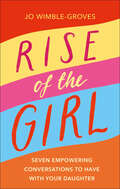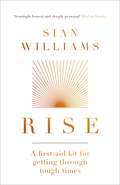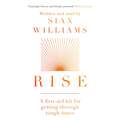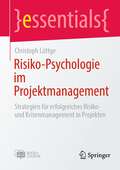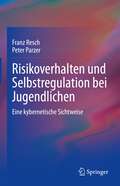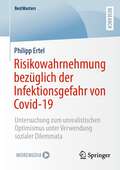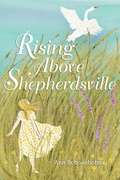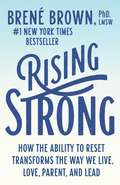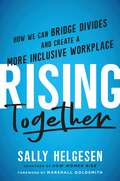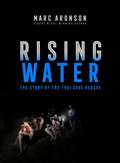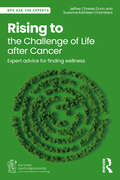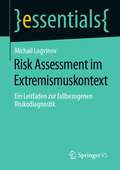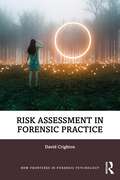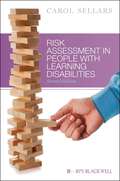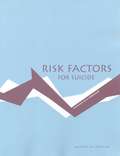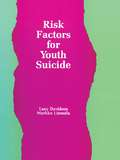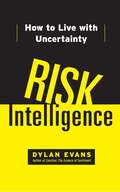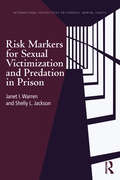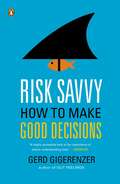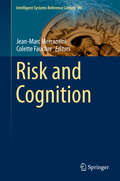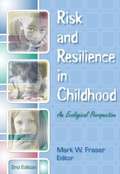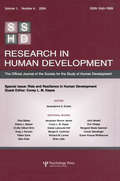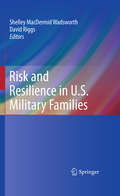- Table View
- List View
Rise of the Girl: Seven Empowering Conversations To Have With Your Daughter
by Jo Wimble-GrovesHelp your daughter become her best, well-rounded self.Raising a girl is complicated. Empowerment messages and incredible achievements are everywhere, yet poor self-esteem, peer pressure, and fear of failure are very real threats. This essential parenting guide shows you the seven most common issues holding girls back from reaching their full potential.Inside the pages of this inspirational parenting book, you&’ll discover: • Action plans for seven key areas of your daughter&’s social, emotional and mental health. • Guided dialogues with customizable options to make them age-appropriate. • Practical parenting tips for raising a girl. • Inspirational accounts from famous moms, dads and daughters. Does your beautiful, talented daughter tell you she&’s ugly and useless? Would she rather stay alone in her room, scrolling her phone, than join you on a family day out? This parenting reference book highlights all signs that your daughter is struggling to cope with the demands of modern life. Follow the practical parenting advice to help your wonderful girl see how great she is already and how much greater she can become!Packed with 7 age-appropriate action plans, parenting advice and guided conversation starters, Rise of the Girl will give you the tools you need to guide your daughter through this challenging world and prepare them for amazing adulthood. It&’s the perfect parenting book for girl moms and dads raising confident, resilient and powerful women!
Rise: A first-aid kit for getting through tough times
by Sian Williams'A week after my 50th birthday and just as our family was about to move home, something happened that changed the way I looked at life. I spoke to others about how they rebuilt their shattered worlds after very different personal traumas, emerging stronger than before. I hope our experiences, together with the latest science on resilience, will help guide all those going through tough times. This book says that it's possible not just to survive them, but to thrive. To rise.'Renowned as a much-loved and highly respected journalist and broadcaster with thirty years' experience, Sian Williams has studied the impact of acute stress for many years and is also a trained trauma assessor.In RISE, she explores the science of resilience and growth after trauma, offers advice from the experts, and learns from those who have emerged from horrific experiences, feeling changed yet stronger, with a new perspective on their life, their relationships and their work. She also documents her own path through breast cancer, with candid and unflinching honesty. Her story provides a narrative thread through a book designed to help others deal with all manner of adversity, including physical or mental ill health; loss of a loved one; abuse and post-traumatic stress.RISE is a deeply researched exploration of trauma, grief and illness, and most importantly resilience in the darkest of days. It is an inspiring and powerful piece of work, full of honesty, warmth and wisdom.
Rise: A first-aid kit for getting through tough times
by Sian WilliamsWhat makes some people get back up when the most difficult and challenging life events, knocks them down? Are some more resilient than others and if so, what can we learn from them?Renowned as a highly-respected journalist and broadcaster with thirty years' experience, Sian Williams is also a trained trauma assessor, and spent two years investigating psychological stress as part of a Master's thesis. In RISE, Sian explores the science of resilience and growth after trauma, hears tips from the experts and learns from those who have emerged from horrific experiences, feeling changed yet stronger, with a new perspective on their life, their relationships and their work. She also documents her own path through a recent and sudden life-changing event, with candid and refreshing honesty. Her own story provides a narrative thread through a book designed to help others navigate through tough times.Sian Williams speaks to others about how they rebuilt their shattered worlds after very different personal traumas, emerging stronger than before. Their experiences, together with the latest science on resilience, should help guide all those going through tough times. This book indicates that it is possible not just to survive them, but to thrive. To rise.(p) 2016 Orion Publishing Group
Risiko-Psychologie im Projektmanagement: Strategien für erfolgreiches Risiko- und Krisenmanagement in Projekten (essentials)
by Christoph LüttgeNichts im Leben und im Projektmanagement geht genau nach Plan. Immer wieder machen uns äußere Ereignisse und Entwicklungen einen Strich durch die Rechnung. Deshalb ist die nüchterne Analyse von Risiken und die Vorbereitung auf entsprechende Krisen ein Schlüsselelement erfolgreichen Projektmanagements. Dem stehen jedoch psychologische Faktoren entgegen. Welche Faktoren dies sind und woher diese kommen und wie man damit umgeht, darauf gibt es Antworten in diesem Buch und dem inkludierten Online Kurs.
Risikoverhalten und Selbstregulation bei Jugendlichen: Eine kybernetische Sichtweise
by Franz Resch Peter ParzerDiesem Buch liegt der Gedanke zugrunde, dass zunehmende jugendliche Risikoverhaltensweisen - wie Drogenmissbrauch, nicht-suizidale Selbstverletzung und antisoziales oder suizidales Verhalten - es Heranwachsenden ermöglichen, Entwicklungsaufgaben wie Identitätsbildung und Selbstwertregulation zu erfüllen. Narzisstische Selbstausbeutung, Mobilitätsaufgaben, Flexibilität und die Herausforderungen der neuen Medien üben sozialen Druck auf die Eltern aus, lenken ab und belasten ihre psychischen Ressourcen, was wiederum den emotionalen Dialog mit ihren Kindern verändert oder gar zerstört. Erleben Kinder selbst Vernachlässigung und mangelnde emotionale Bindung - und damit fehlende Selbstregulationsfähigkeit - sind Risikoverhaltensweisen die Folge.Das Buch kombiniert verschiedene Sichtweisen aus dem psychologischen, sozialen und metatheoretischen Bereich. Es besteht aus drei Teilen: Entwicklungsprobleme junger Menschen, Diagnose von Risikoverhaltensweisen im nosologischen Rahmen und Darstellung der neuen Morbidität mit einer Zunahme der Symptomprävalenz. Das Buch erörtert auch die Bedrohung durch die Beschleunigung der sozialen Prozesse und die Risiken der postmodernen Gesellschaft.
Risikowahrnehmung bezüglich der Infektionsgefahr von Covid-19: Untersuchung zum unrealistischen Optimismus unter Verwendung sozialer Dilemmata (BestMasters)
by Philipp ErtelDie Corona-Pandemie hat gezeigt, dass die Gefahr, sich selbst und andere mit einem bedrohlichen Virus anzustecken, zu einer Vielzahl sozialer Dilemma-Situationen im Alltag führt. Das vorliegende Buch geht der sozialpsychologischen Frage nach, wie Menschen das Risiko einer Covid-19-Infektion in konkreten Dilemma-Situationen für sich selbst und für eine andere Person einschätzen. Dabei wird der Fokus auf die Differenz zwischen der selbst- und fremdbezogen Risikowahrnehmung sowie zwischen der selbstbezogenen Risikowahrnehmung und der objektiven Risikobeurteilung mittels eines Algorithmus gelegt. Diese Differenz wird in der Risikoforschung als unrealistischer Optimismus/Pessimismus bezeichnet. Neben der Beleuchtung des aktuellen Forschungsstands wird die Risikowahrnehmung und das Auftreten des unrealistischen Optimismus/Pessimismus im Rahmen einer Querschnittsstudie anhand von drei fiktiven, aber realitätsnahen Dilemma-Szenarien aus dem Corona-Kontext untersucht und diskutiert.
Rising Above Shepherdsville (Fountas & Pinnell LLI Blue)
by Ann SchoenbohmIn the tradition of The Higher Power of Lucky and Because of Winn Dixie, a young girl deals with her mother’s suicide in this riveting debut novel that explores love, loss, family, friendship, and redemption.In the summer of 1977, twelve-year-old Dulcie Louise Dixon arrives on the doorstep of her Aunt Bernie’s farmhouse in Shepherdsville, Ohio, with no voice, a spelling bee trophy, a Webster’s Dictionary, and a box full of ashes. She tries to adjust to her new situation, but can’t forget the words she left behind or the mother she’s lost to suicide. One day, Dulcie discovers a secret place: a swan’s nest in the woods where at last, her broken world begins to mend. With the help of her surprising new friends—a guitar-playing runaway, a poetry-loving preacher, a one-armed gas station attendant, a singing seamstress, a chained-up hunting dog, and a family of swans—Dulcie is finally able to rise out of her sadness and grief to find her voice once again.
Rising Strong: How the Ability to Reset Transforms the Way We Live, Love, Parent, and Lead
by Brené Brown#1 NEW YORK TIMES BESTSELLER • When we deny our stories, they define us. When we own our stories, we get to write the ending. Don&’t miss the five-part Max docuseries Brené Brown: Atlas of the Heart! Social scientist Brené Brown has ignited a global conversation on courage, vulnerability, shame, and worthiness. Her pioneering work uncovered a profound truth: Vulnerability—the willingness to show up and be seen with no guarantee of outcome—is the only path to more love, belonging, creativity, and joy. But living a brave life is not always easy: We are, inevitably, going to stumble and fall. It is the rise from falling that Brown takes as her subject in Rising Strong. As a grounded theory researcher, Brown has listened as a range of people—from leaders in Fortune 500 companies and the military to artists, couples in long-term relationships, teachers, and parents—shared their stories of being brave, falling, and getting back up. She asked herself, What do these people with strong and loving relationships, leaders nurturing creativity, artists pushing innovation, and clergy walking with people through faith and mystery have in common? The answer was clear: They recognize the power of emotion and they&’re not afraid to lean in to discomfort. Walking into our stories of hurt can feel dangerous. But the process of regaining our footing in the midst of struggle is where our courage is tested and our values are forged. Our stories of struggle can be big ones, like the loss of a job or the end of a relationship, or smaller ones, like a conflict with a friend or colleague. Regardless of magnitude or circumstance, the rising strong process is the same: We reckon with our emotions and get curious about what we&’re feeling; we rumble with our stories until we get to a place of truth; and we live this process, every day, until it becomes a practice and creates nothing short of a revolution in our lives. Rising strong after a fall is how we cultivate wholeheartedness. It&’s the process, Brown writes, that teaches us the most about who we are.ONE OF GREATER GOOD&’S FAVORITE BOOKS OF THE YEAR&“[Brené Brown&’s] research and work have given us a new vocabulary, a way to talk with each other about the ideas and feelings and fears we&’ve all had but haven&’t quite known how to articulate. . . . Brené empowers us each to be a little more courageous.&”—The Huffington Post
Rising Together: How We Can Bridge Divides and Create a More Inclusive Workplace
by Sally HelgesenIn this follow-up to her international bestseller How Women Rise, Sally Helgesen draws on three decades of work with executives and aspiring leaders around the world to offer practical ways to build more inclusive relationships, teams, and workplaces. Participants at leadership conferences often tell Sally, &“Please don&’t spend your time telling us why developing and retaining a diverse workforce is important. We get it. The problem is, we don&’t know how to do it.&” Rising Together provides that missing how in full detail by identifying both what holds us back and specific tactics that can help us move forward. First, Sally identifies the eight common triggers most likely to undermine our ability to collaborate across divides—not only of gender, but also of age, ethnicity, race, sexuality, and life experience. These triggers are widespread, yet rarely acknowledged. They include differences in how people from different backgrounds view ambition, competence, perceptions, fairness, communication, networks, attraction, and humor. Sally then offers specific practices designed to address these triggers: simple behavioral tweaks that we can use on a daily basis; a method for informally enlisting allies to hold us to account; and a means for cultivating and disseminating the dynamic power of we.Rising Together is for readers at every stage and level in their careers who recognize that building a broad range of relationships is essential to their advancement, now and in the future. This book also serves as an indispensable guide for HR, diversity, and leadership professionals tasked with addressing the misunderstandings, resentments, and derailments caused by the eight triggers. Sally&’s focus on behaviors—how we act—rather than bias—how we think—promises to redirect the inclusion conversation in a grounded, real-world way that brings us together.
Rising Water: The Story of the Thai Cave Rescue
by Marc AronsonThe incredible true story of the twelve boys trapped with their coach in a flooded cave in Thailand and their inspiring rescue—as seen in Ron Howard's Thirteen Lives.On June 23, 2018, twelve members of the Wild Boars soccer team and their coach were exploring the Tham Luang cave complex in northern Thailand when disaster struck. A rainy season downpour flooded the tunnels, trapping them as they took shelter on a shelf of the dark cave. Eight days of searching yielded no signs of life, but on July 2 they were discovered by two British divers. The boys and their coach were eventually rescued in an international operation that took three days. What could have been a terrible tragedy became an amazing story of survival. Award-winning author Marc Aronson brings us the backstory behind how this astounding rescue took place. Rising Water highlights the creative thinking and technology that made a successful mission possible by examining the physical, environmental, and psychological factors surrounding the rescue. From the brave Thai Navy SEAL who lost his life while placing oxygen tanks along the passageways of the cave, to the British divers that ultimately swam the boys to safety, to the bravery of the boys and their coach, this is the breathtaking rescue that captivated the entire world.
Rising to the Challenge of Life After Cancer: Expert Advice for Finding Wellness (BPS Ask The Experts in Psychology Series)
by Jeffrey Charles Dunn Suzanne Kathleen ChambersRising to the Challenge of Life After Cancer: Expert Advice for Finding Wellness is an easy-to-read self-help guide for people facing cancer diagnosis and treatment. Following an effective Q&A format and based on a unique Wellbeing Essentials framework, it offers a valuable ‘dip in and out’ approach with signposting to evidence-based guidance on major challenges that those diagnosed with cancer and their family and friends may face. If you or someone close to you has had a cancer diagnosis, then this book is for you.With a focus on wellness and taking control, questions addressed include ‘Is there a best way to cope with cancer?’, ‘What strategies can help me make an informed decision about treatment?’, ‘What is prehabilitation and how can this help me?’, and ‘Who am I now?’. The book covers an array of essential guidance from maintaining social health and wellbeing, to accessing care and support in the community. It is written for both those living with or beyond cancer as well as their support network. The book also includes Jeff and Suzanne’s personal stories about their lived experience of cancer and a Resources and Connections section with tips for further information and support.Written by academic experts who are also ‘experts by experience’, this book is indispensable for people with cancer and their families, and anyone wanting to understand more about the condition, as well as health and social care professionals and students of social care, health care and nursing.
Risk Assessment im Extremismuskontext: Ein Leitfaden zur fallbezogenen Risikodiagnostik (essentials)
by Michail LogvinovDieses essential bündelt das in der Prognoseforschung generierte Wissen über die Risiken und Gefahren der extremistischen Gewalttäter. Nach einer Besprechung internationaler Risk-Assessment-Instrumente wird ein Leitfaden zur Diskussion gestellt, der im engen Austausch mit Fachpraktikern entstanden ist.
Risk Assessment in Forensic Practice (New Frontiers in Forensic Psychology)
by David CrightonRisk Assessment in Forensic Practice sets out a concise critical review of the way in which risk is assessed in current forensic practice. Setting the area in its historical context, this text outlines current practice in an accessible and clear format and discusses major critiques as well as the ways in which current practice might be developed to improve public protection. Providing an account of the main issues involved in risk and probability and the ways that these have been applied in practice, the book describes current forensic practice in relation to the dominant algorithmic and checklist-based methods. Critiques of these arising from social-legal, risk analysis and experimental psychology perspectives are summarised, and questions of the accuracy, fairness and lack of analysis are considered, along with the main challenges associated with making group and individual predictions of events. The text rejects the idea that clinical assessments of risk are generally ineffective and stresses the role of environmental context, training and expertise in improving practice. Through the author’s work in the field, this text also offers insight into the ways in which current practice might be improved and calls for greater analysis and methodological rigour. Risk Assessment in Forensic Practice appeals to a wide range of forensic practitioners including psychologists, psychiatrists, social workers, mental health nurses and lawyers. The text is also relevant to those involved in management and decision-making across forensic settings.
Risk Assessment in People With Learning Disabilities
by Carol SellarsRisk Assessment in People with Learning Disabilities, Second Edition reflects legislative updates made over the past decade while continuing to demystify the process of assessing risk for people with intellectual impairment (previously called 'learning disabilities').Revisits techniques of risk assessment outlined in First Edition in light of the recent legislative changes, most notably the 2005 Mental Capacity ActCovers methods of assessing a person's capacity to consent in a range of situations, from the everyday, to complex medical or psychological scenariosCovers implications of new guidelines issued in relation to the Care Programme Approach (CPA)
Risk Factors For Suicide: summary of a workshop
by Sara K. GoldsmithThe National Academies Press (NAP)--publisher for the National Academies--publishes more than 200 books a year offering the most authoritative views, definitive information, and groundbreaking recommendations on a wide range of topics in science, engineering, and health. Our books are unique in that they are authored by the nation's leading experts in every scientific field.
Risk Factors for Youth Suicide (Death Education, Aging and Health Care)
by Lucy Davidson Markku LinnoilaFirst published in 1990. Routledge is an imprint of Taylor & Francis, an informa company.
Risk Intelligence
by Dylan EvansWe must make judgments all the time when we can't be certain of the risks. Should we have that elective surgery? Trust the advice of our financial adviser? Take that new job we've been offered? How worried should we be about terrorist attacks? In this lively and groundbreaking book, pioneering researcher Dylan Evans introduces a newly discovered kind of intelligence for assessing risks, demonstrating how vital this risk intelligence is in our lives and how we can all raise our RQs in order to make better decisions every day. Evans has spearheaded the study of risk intelligence, devising a simple test to measure a person's RQ which when posted online sparked a storm of interest and was taken by tens of thousands of people. His research has revealed that risk intelligence is quite different from IQ, and that the vast majority of us have quite poor risk intelligence. However, he did find some people who have very high RQs. So what makes the difference? Introducing a wealth of fascinating research findings, Evans identifies a key set of common errors in our thinking that most of us fall victim to and that undermine our risk intelligence, such as "ambiguity aversion," overconfidence in our knowledge, the fallacy of mind reading, and our attraction to worst-case scenarios. We are also regularly led astray by the ways in which information is provided to us. Citing a wide range of real-life examples-- from the brilliant risk assessment skills of horse race handicappers to the tragically flawed evaluations of risk that caused the financial crisis--Evans illustrates that sometimes our most trusted advisers, including the experts and analysts at the top of their disciplines, don't always give us the best advice when it comes to risk evaluation. Presenting his revolutionary test that allows readers to evaluate their own RQs, Evans introduces a number of simple techniques we can use to build our risk assessment powers and reports on the striking results he's seen in training people to develop their RQs. Both highly engaging and truly mind-changing, Risk Intelligence will fascinate all of those who are interested in how we can improve our thinking in order to enhance our lives.
Risk Intelligence
by Dylan EvansWe must make judgments all the time when we can't be certain of the risks. Should we have that elective surgery? Trust the advice of our financial adviser? Take that new job we've been offered? How worried should we be about terrorist attacks? In this lively and groundbreaking book, pioneering researcher Dylan Evans introduces a newly discovered kind of intelligence for assessing risks, demonstrating how vital this risk intelligence is in our lives and how we can all raise our RQs in order to make better decisions every day. Evans has spearheaded the study of risk intelligence, devising a simple test to measure a person's RQ which when posted online sparked a storm of interest and was taken by tens of thousands of people. His research has revealed that risk intelligence is quite different from IQ, and that the vast majority of us have quite poor risk intelligence. However, he did find some people who have very high RQs. So what makes the difference? Introducing a wealth of fascinating research findings, Evans identifies a key set of common errors in our thinking that most of us fall victim to and that undermine our risk intelligence, such as "ambiguity aversion," overconfidence in our knowledge, the fallacy of mind reading, and our attraction to worst-case scenarios. We are also regularly led astray by the ways in which information is provided to us. Citing a wide range of real-life examples-- from the brilliant risk assessment skills of horse race handicappers to the tragically flawed evaluations of risk that caused the financial crisis--Evans illustrates that sometimes our most trusted advisers, including the experts and analysts at the top of their disciplines, don't always give us the best advice when it comes to risk evaluation. Presenting his revolutionary test that allows readers to evaluate their own RQs, Evans introduces a number of simple techniques we can use to build our risk assessment powers and reports on the striking results he's seen in training people to develop their RQs. Both highly engaging and truly mind-changing, Risk Intelligence will fascinate all of those who are interested in how we can improve our thinking in order to enhance our lives.
Risk Markers for Sexual Victimization and Predation in Prison (International Perspectives on Forensic Mental Health)
by Shelly L. Jackson Janet I. WarrenIn 2003, the US Senate and Congress passed the Prison Rape Elimination Act (PREA), prompting a number of research projects that cumulatively began to broaden and deepen our understanding of this complex aspect of prison life. Risk Markers for Sexual Victimization and Predation in Prison contains the results of Dr. Warren and Dr. Jackson’s study, and it extends the literature on prison rape in important and distinct ways. Their research, which encompasses the full continuum of sexual behavior among incarcerated individuals, succeeds in identifying multi-layered predictive models for different types of sexual behavior across and within genders. The process by which the authors came to their study design, their experiences while implementing it, and the nature and significance of their findings, represent the content of this book.
Risk Savvy
by Gerd GigerenzerAn eye-opening look at the ways we misjudge risk every day and a guide to making better decisions with our money, health, and personal lives In the age of Big Data we often believe that our predictions about the future are better than ever before. But as risk expert Gerd Gigerenzer shows, the surprising truth is that in the real world, we often get better results by using simple rules and considering less information. In Risk Savvy, Gigerenzer reveals that most of us, including doctors, lawyers, financial advisers, and elected officials, misunderstand statistics much more often than we think, leaving us not only misinformed, but vulnerable to exploitation. Yet there is hope. Anyone can learn to make better decisions for their health, finances, family, and business without needing to consult an expert or a super computer, and Gigerenzer shows us how. Risk Savvy is an insightful and easy-to-understand remedy to our collective information overload and an essential guide to making smart, confident decisions in the face of uncertainty.
Risk Savvy
by Gerd GigerenzerAn eye-opening look at the ways we misjudge risk every day and a guide to making better decisions with our money, health, and personal livesIn the age of Big Data we often believe that our predictions about the future are better than ever before. But as risk expert Gerd Gigerenzer shows, the surprising truth is that in the real world, we often get better results by using simple rules and considering less information.In Risk Savvy, Gigerenzer reveals that most of us, including doctors, lawyers, financial advisers, and elected officials, misunderstand statistics much more often than we think, leaving us not only misinformed, but vulnerable to exploitation. Yet there is hope. Anyone can learn to make better decisions for their health, finances, family, and business without needing to consult an expert or a super computer, and Gigerenzer shows us how.Risk Savvy is an insightful and easy-to-understand remedy to our collective information overload and an essential guide to making smart, confident decisions in the face of uncertainty.
Risk and Cognition
by Jean-Marc Mercantini Colette FaucherThis book presents recent research using cognitive science to apprehend risk situations and elaborate new organizations, new systems and new methodological tools in response. The book demonstrates the reasons, advantages and implications of the association of the concepts of cognition and risk. It is shown that this association has strong consequences on how to apprehend critical situations that emerge within various activity domains, and how to elaborate responses to these critical situations. . The following topics are covered by the book: · Influence of the culture in risk management, · Influence of the risk communication in risk management, · User-centred design to improve risk situation management, · Designing new tools to assist risk situation management, · Risk prevention in industrial activities.
Risk and Resilience in Childhood: An Ecological Perspective
by Mark W. Fraser"Literature is replete with stories of children who recover against impossible odds. No less dramatic are real-life accounts in social work case files. But why are some children so resilient when others are not? How can social work practice appropriate these positive forces on behalf of more children? This book takes a major leap forward from other social work texts to probe not only risk but resilience and the protective factors that promote positive developmental outcomes. Firmly research based, it bridges the gap between ecological theory and strengths-based practice and provides a foundation for developing case-specific interventions. <P><P>Building on the concepts and models articulated so expertly in the best-selling first edition, the authors of Risk and Resilience, 2nd Edition introduce a framework and interdisciplinary language for understanding and conceptualizing social and health problems of children and their families. Readers will easily draw implications for practice from its clear and organized presentation. Using an ecological and multisystems perspective, each chapter examines risk and protective factors for specific social problems and disorders in childhood, including drug abuse, school failure, adolescent pregnancy, and delinquency. <P><P> This book is a compelling and rich resource for practitioners, scholars, and educators.Special Features * Summarizes and distills for social work practice the latest research on risk factors for childhood problems. * Devotes a full chapter to suicidal behaviors among youth. * Describes how to tailor interventions on the basis of race, ethnicity, gender, and sexual orientation."
Risk and Resilience in Human Development: A Special Issue of Research in Human Development
by Corey L. M. KeyesThis special issue is devoted to the topic of "risk and resilience" in human development, a topic that epitomizes the complexity of human development as a process of constancy and change throughout life. The three empirical papers in this issue represent strong contributions to the growing corpus of research on risk and resilience in human development. The first one focuses on the uniquely vulnerable population of urban ethnic minority adolescent males. The second paper focuses on the risk and resilience from trauma in a sample of mostly Caucasian individuals from rural Iowa, who were at the last assessment, in the midst of transition into young adulthood. It measures an array of mental disorders outcomes and reveals the theoretical importance of timing of the risk factor. The last paper is a study begun in 1978 of a cohort of individuals with serious adolescent-onset mental disorder. It compares these individuals against the risk and resilience profiles of a matched sample without serious adolescent-onset psychiatric disorder. In sum this issue adds to the corpus of the frontiers of resilience research.
Risk and Resilience in U.S. Military Families
by Macdermid-Wadsworth Shelley David RiggsWar related separations challenge military families in many ways. The worry and uncertainty associated with absent family members exacerbates the challenges of personal, social, and economic resources on the home front. U.S. military operations in Iraq and Afghanistan have sent a million service personnel from the U.S. alone into conflict areas leaving millions of spouses, children and others in stressful circumstances. This is not a new situation for military families, but it has taken a toll of magnified proportions in recent times. In addition, medical advances have prolonged the life of those who might have died of injuries. As a result, more families are caring for those who have experienced amputation, traumatic brain injury, and profound psychological wounds. The Department of Defence has launched unprecedented efforts to support service members and families before, during, and after deployment in all locations of the country as well as in remote locations. Stress in U.S. Military Families brings together an interdisciplinary group of experts from the military to the medical to examine the issues of this critical problem. Its goal is to review the factors that contribute to stress in military families and to point toward strategies and policies that can help. Covering the major topics of parenting, marital functioning, and the stress of medical care, and including a special chapter on single service members, it serves as a comprehensive guide for those who will intervene in these problems and for those undertaking their research.
